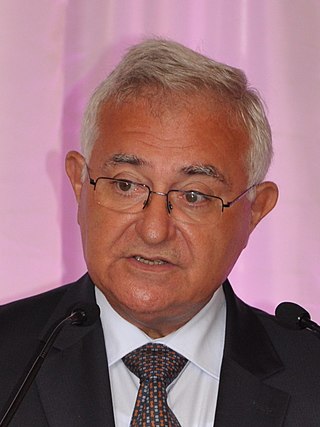The Big Four are the four largest professional services networks in the world: Deloitte, EY, KPMG, and PwC. They are the four largest global accounting networks as measured by revenue. The four are often grouped because they are comparable in size relative to the rest of the market, both in terms of revenue and workforce; they are considered equal in their ability to provide a wide scope of professional services to their clients; and, among those looking to start a career in professional services, particularly accounting, they are considered equally attractive networks to work in, because of the frequency with which these firms engage with Fortune 500 companies.

Roberto Calvi was an Italian banker, dubbed "God's Banker" by the press because of his close business dealings with the Holy See. He was a native of Milan and was chairman of Banco Ambrosiano, which collapsed in one of Italy's biggest political scandals.

KPMG International Limited is a multinational professional services network, and one of the Big Four accounting organizations, along with Ernst & Young (EY), Deloitte, and PwC. The name "KPMG" stands for "Klynveld Peat Marwick Goerdeler". The initialism was chosen when KMG merged with Peat Marwick in 1987.

An audit is an "independent examination of financial information of any entity, whether profit oriented or not, irrespective of its size or legal form when such an examination is conducted with a view to express an opinion thereon." Auditing also attempts to ensure that the books of accounts are properly maintained by the concern as required by law. Auditors consider the propositions before them, obtain evidence, roll forward prior year working papers, and evaluate the propositions in their auditing report.

Paul van Buitenen is a retired Dutch politician of the Europe Transparent Party who served as a Member of the European Parliament from 2004 to 2009.

The European Court of Auditors is the supreme audit institution of the European Union (EU). It was established in 1975 in Luxembourg and is one of the seven EU institutions. The Court comprises one member from each EU member state supported by approximately 800 civil servants.
The sponsorship scandal, AdScam or Sponsorgate, was a scandal in Canada that came as a result of a federal government "sponsorship program" in the province of Quebec involving the Liberal Party of Canada, which was in power from 1993 to 2006.

John Dalli is a Maltese former politician who served as Cabinet Minister in various Maltese governments between 1987 and 2010. He was European Commissioner for Health and Consumer Policy between 2010 and 2012.
Hans-Martin Tillack, is a German reporter, who grew up in Stuttgart.

The Audit Commission was a statutory corporation in the United Kingdom. The commission's primary objective was to appoint auditors to a range of local public bodies in England, set the standards for auditors and oversee their work. The commission closed on 31 March 2015, with its functions being transferred to the voluntary, not-for-profit or private sector.

The budget of the European Union is used to finance EU funding programmes and other expenditure at the European level.

Friends of Clean Accounts is a group of European politicians advocating and working towards "clean accounts" of the EU. By this they mean ordinary accounting and controlling, leading to efficient use of funds throughout the EU. An important part of this endeavor is transparent information and free access to it.

Marta Andreasen is an Argentine-born Spanish accountant. She was employed in January 2002 by the European Commission as Chief Accountant, and raised concerns about flaws in the commission's accounting system which she felt left it vulnerable to potential fraud. Elected as a Member of the European Parliament for the UK Independence Party (UKIP) in the 2009 election, she defected to the Conservative Party in February 2013. She lost her seat in the 2014 European Parliamentary election.
Wirecard AG is an insolvent German payment processor and financial services provider whose former CEO, COO, two board members, and other executives have been arrested or otherwise implicated in criminal proceedings. In June 2020, the company announced that €1.9 billion in cash was missing. It owed €3.2 billion in debt. In November 2020, the company was dismantled after it sold the assets of its main business unit to Santander Bank for €100 million. Other assets, including its North American, UK and Brazilian units had been previously sold at nondisclosed prices. The company offered electronic payment transaction services and risk management, and issued and processed physical and virtual cards. As of 2017, the company was listed on the Frankfurt Stock Exchange, and was a part of the DAX stock index from September 2018 to August 2020.
In financial regulation, a politically exposed person (PEP) is one who has been entrusted with a prominent public function. A PEP generally presents a higher risk for potential involvement in bribery and corruption by virtue of their position and the influence they may hold. The terms "politically exposed person" and senior foreign political figure are often used interchangeably, particularly in international forums.
Forensic accountants are experienced auditors, accountants, and investigators of legal and financial documents that are hired to look into possible suspicions of fraudulent activity within a company; or are hired by a company who may just want to prevent fraudulent activities from occurring. They also provide services in areas such as accounting, antitrust, damages, analysis, valuation, and general consulting. Forensic accountants have also been used in divorces, bankruptcy, insurance claims, personal injury claims, fraudulent claims, construction, royalty audits, and tracking terrorism by investigating financial records. Many forensic accountants work closely with law enforcement personnel and lawyers during investigations and often appear as expert witnesses during trials.
The Satyam Computer Services scandal was India's largest corporate fraud until 2010. The founder and directors of India-based outsourcing company Satyam Computer Services, falsified the accounts, inflated the share price, and stole large sums from the company. Much of this was invested in property. The swindle was discovered in late 2008 when the Hyderabad property market collapsed, leaving a trail back to Satyam. The scandal was brought to light in 2009 when chairman Byrraju Ramalinga Raju confessed that the company's accounts had been falsified.

Accounting scandals are business scandals which arise from intentional manipulation of financial statements with the disclosure of financial misdeeds by trusted executives of corporations or governments. Such misdeeds typically involve complex methods for misusing or misdirecting funds, overstating revenues, understating expenses, overstating the value of corporate assets, or underreporting the existence of liabilities; these can be detected either manually, or by the means of deep learning. It involves an employee, account, or corporation itself and is misleading to investors and shareholders.

The European Union employs a variety of public accountability measures to review and reform budgets across government. As the EU's budget is at risk of maladministration, every year the Court of Auditors reports on the management of the budget. European Union auditors have stated that as they implement more transparency and double-entry book-keeping systems, it is likely to improve budget management.

The Wirecard scandal was a series of corrupt business practices and fraudulent financial reporting that led to the insolvency of Wirecard, a payment processor and financial services provider, headquartered in Munich, Germany. The company was part of the DAX index. They offered customers electronic payment transaction and risk management services, as well as the issuance and processing of physical cards. The subsidiary, Wirecard Bank AG, held a banking license and had contracts with multiple international financial services companies.










